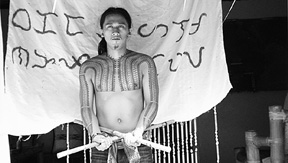Green Rocking Chair
Juan Baybayin THE PHILIPPINES / 2008 / Filipino / Color, B&W / Video / 61 min
THE PHILIPPINES / 2008 / Filipino / Color, B&W / Video / 61 min
Director, Script: Roxlee
Photography: Albert Banzon, Jim Lumbera, Bulan
Editing: Lot Arboleda, Jim Lumbera, JP Papa, Mark Mirabuenos
Music: Roxlee, Kadangyan, Hanunuo Mangyan Tribe
Animations: Roxlee, Lot Arboleda, Enzo Florentino, UPFI Animation Workshop 2007
World Sales, Source: Baybayin Productions www.baybayinproductions.com
Throughout the islands of the Philippines, Baybayin still lives! Long before Magellan arrived in the Philippines in 1521, armed with Christianity and the Spanish language, the indigenous Baybayin writing system was all the people had known. A traveler (Roxlee) wanders the streets in search of this script and along the way encounters colorful artists, revolutionaries, and local children. Making an appearance is an animation of “The Monkey and the Turtle,” the Filipino fable depicted by national hero José Rizal, as director and comic artist Roxlee concocts a playful and lively portrait of the Philippines. This is Roxlee’s all-out road movie.
 [Director’s Statement] During the 300-plus years of Spanish colonization of the Philippines, the Spaniards attempted to erase the indigenous writing system from Filipino consciousness, and it seems the colonizers succeeded. Today, most Filipinos do not care or are not even aware that such a writing system exists or ever existed. The filmmakers hope to provide viewers with a glimpse of this writing system by exploring Baybayin, the age-old indigenous script. Especially for Filipino audiences, the aim is to increase appreciation of their own culture. Imagine if the Spaniards colonized Japan and erased the Japanese writing system: the kanji, hiragana, and katakana characters used today would not exist. As for the letters KKK in the movie, they do not stand for the Ku Klux Klan but for Kataas-taasan Kagalang-galangang Katipunan ng mga Anak ng Bayan, which means Supreme and Venerable Society of the Children of the Nation. The Katipunan was the earliest underground revolutionary movement of Filipinos against the Spaniards.
[Director’s Statement] During the 300-plus years of Spanish colonization of the Philippines, the Spaniards attempted to erase the indigenous writing system from Filipino consciousness, and it seems the colonizers succeeded. Today, most Filipinos do not care or are not even aware that such a writing system exists or ever existed. The filmmakers hope to provide viewers with a glimpse of this writing system by exploring Baybayin, the age-old indigenous script. Especially for Filipino audiences, the aim is to increase appreciation of their own culture. Imagine if the Spaniards colonized Japan and erased the Japanese writing system: the kanji, hiragana, and katakana characters used today would not exist. As for the letters KKK in the movie, they do not stand for the Ku Klux Klan but for Kataas-taasan Kagalang-galangang Katipunan ng mga Anak ng Bayan, which means Supreme and Venerable Society of the Children of the Nation. The Katipunan was the earliest underground revolutionary movement of Filipinos against the Spaniards.
 Roxlee
RoxleeBorn in 1950 in Naga City, Philippines, Roque Federizon Lee, better known as Roxlee, is an advocate of independent and underground film in the Philippines. He started as a cartoonist and began making animation and short films in 1983. He and his brother, Ramon, made a full-length 35mm feature film Cesar Asar, based on their popular comic strip. He is one of the founders of a Filipino animators group called Animagination, and of Sinekalye (street cinema), a group of filmmakers, visual artists, and musicians who share a passion for independently produced art. An artist fellowship from the Japan Foundation enabled him to live in Tokyo from 1992 to ’93. In the late ’80s, he was given a retrospective in Hamburg and Berlin. His films have been screened at festivals in Hong Kong, Singapore, Indonesia, Rotterdam, Los Angeles, and elsewhere. Harajuku was screened at YIDFF ’93. He’s made festival trailers and designed T-shirts for YIDFF. |
